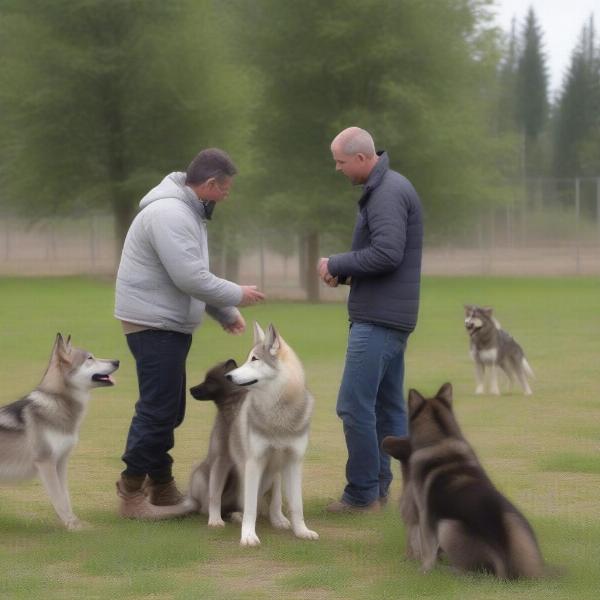Wolfdogs, captivating creatures blending the wild spirit of a wolf with the companionship of a dog, have captured the hearts of many. However, owning a wolfdog is a significant commitment requiring extensive research and careful consideration. If you’re determined to embark on this unique journey, finding a reputable wolf dog breeder is paramount. This article will guide you through the essential steps of locating ethical breeders, understanding the nuances of different wolfdog content percentages, and ensuring you’re prepared for the responsibilities that come with welcoming a wolfdog into your life.
Understanding Wolfdog Content Percentages and Their Impact on Temperament
Before searching for wolf dog breeders, it’s crucial to grasp the concept of wolfdog content percentages. This percentage refers to the amount of wolf DNA present in the animal. Low-content wolfdogs (LC), with a smaller percentage of wolf DNA, often exhibit more dog-like traits, while high-content wolfdogs (HC) possess more wolf-like characteristics, both physically and behaviorally. Mid-content wolfdogs (MC) fall somewhere in between. Understanding these distinctions is vital as they significantly influence the wolfdog’s temperament, trainability, and overall suitability as a companion animal. Higher wolf content typically translates to increased predatory instincts, heightened sensitivity, and a stronger need for socialization and specialized training.
Locating Reputable Wolf Dog Breeders: Key Considerations
Finding ethical and responsible wolf dog breeders requires diligent research and careful vetting. Start by contacting wolfdog rescue organizations and breed-specific groups. They often maintain lists of reputable breeders or can provide valuable referrals. Online forums and social media groups dedicated to wolfdogs can also be helpful resources, but always approach information from these sources with a critical eye. When evaluating potential breeders, ask questions about their breeding practices, the health testing they perform on their animals, and their commitment to socializing their wolfdog puppies. A responsible breeder will prioritize the well-being of their animals and be transparent about their lineage and health history.
 Reputable Wolfdog Breeder Meeting Puppies
Reputable Wolfdog Breeder Meeting Puppies
Preparing for Wolfdog Ownership: Essential Steps
Owning a wolfdog is a significant undertaking that demands extensive preparation. Their unique needs differ substantially from those of domestic dogs. Secure fencing, specialized training, and a deep understanding of wolf behavior are essential for responsible wolfdog ownership. Research local regulations regarding wolfdog ownership, as restrictions vary significantly. Consider the long-term commitment required, including the financial implications of specialized diets, veterinary care, and potential enclosure modifications.
Are You Ready for a Wolfdog? Honest Self-Assessment
Before welcoming a wolfdog into your life, honestly assess your lifestyle, experience with canines, and ability to meet their unique needs. Wolfdogs require experienced owners who are prepared to dedicate significant time, effort, and resources to their care and training. If you’re a first-time dog owner or live in an urban environment, a wolfdog may not be the right fit. Consider adopting a dog breed with similar characteristics, such as a big gentle dog breeds, Tamaskan dog puppies, or a Samoyed dog adoption. Remember, responsible ownership begins with choosing a companion that aligns with your capabilities and lifestyle.
Conclusion
Finding wolf dog breeders is a crucial first step in the journey of wolfdog ownership. By understanding the complexities of wolfdog content percentages, researching reputable breeders, and thoroughly preparing for their unique needs, you can make an informed decision about whether a wolfdog is the right companion for you. Remember, responsible ownership ensures the well-being of these magnificent animals and fosters a harmonious relationship between humans and their wild counterparts.
FAQ
-
Are wolfdogs legal to own? Wolfdog ownership legality varies greatly depending on location. Check your local and state regulations.
-
What is the average lifespan of a wolfdog? Wolfdogs typically live between 12-15 years.
-
Do wolfdogs make good family pets? Wolfdogs can be challenging family pets due to their complex needs and are generally not recommended for households with young children.
-
What do wolfdogs eat? A balanced diet similar to that of a dog, often supplemented with raw meat, is recommended.
-
Are wolfdogs easy to train? Wolfdogs can be challenging to train due to their independent nature and require experienced handlers.
-
How much exercise does a wolfdog need? Wolfdogs require significant daily exercise and mental stimulation.
-
Where can I find more information about wolfdog ownership? Consult with reputable wolfdog rescue organizations and breed-specific groups for further information.
ILM Dog is your trusted resource for expert advice on dog breeds, care, and training. We offer a comprehensive range of information, from breed selection guides to health and nutrition tips, designed to empower you to provide the best possible care for your canine companion. Contact us at [email protected] or +44 20-3965-8624 for personalized guidance. ILM Dog is committed to helping you navigate the world of dog ownership with confidence.